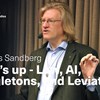resolut

Melinda A. Roberts
I am a professor of philosophy at the College of New Jersey and serve as the coordinating prelaw advisor for the College. Previously, I worked as an associate at the law firm of Cleary, Gottlieb in Ne
The ambivalence of desistance: Balancing in the liminal space between deviance and conventionality
European Journal of Criminology Abstract Building and expanding on contemporary research where desistance is increasingly conceived of asa fragile and liminal experience, this paper examines the early dof ambivalence – an undertheorised concept in life course criminology. This paper employs qualitativeinterviews from a total of 10 participants who participated in SIG, a voluntary defector programmein Sweden. Despite having formulated a clear resolve to desist, the participantsnonetheless experienced feelings of ambivalence in relation to the desistance process. In theseinstances, the aspiring desisters were bordering between the prospects of a better, crime-freelife and the pains, losses, struggles and frustrations accompanying the early stages of desistance.It is argued that this liminal position, where the old life is to be discarded and a new, better lifeis yet to be built, may constitute a breeding ground for ambivalence – a state which needs tobe grounded in the precarious social position of marginalised youth which aspiring desisters typicallyoccupy.

A new theory about the relation between cognitive ability and moral opinions
Why is it that people with higher cognitive ability tend to have more liberal opinions on moral issues? This project will try to offer an explanation.
Weighing Absolute and Relative Proportionality in Punishment
in Tonry, M. (ed.) Of One-eyed and Toothless Miscreants: Making the Punishment Fit the Crime? Oxford: Oxford University Press. Abstract Conflicts between relative and absolute proportionality are an imp
Research seminar with Anders Sandberg: Serf’s Up: Law, AI, Singletons and Leviathan
Venue: Institutet för framtidsstudier, Holländargatan 13, StockholmRegister hereWelcome to this research seminar with Anders Sandberg, Ph.D. in computational neuroscience, researcher at IFFS and Senior

Anders Sandberg: Serf's up - Law, AI, Singletons and Leviathan
Research seminar with Anders Sandberg, Ph.D. in computational neuroscience, researcher at IFFS and Senior Research Fellow at the Future of Humanity Institute, Oxford University. Abstract A key problem
Deep moral disagreements and defective contexts
Synthese Abstract The key characteristic of deep disagreements is that any attempt to resolve them just reveals new points of disagreement that stem from underlying commitments. Many moral disagreementsInformal LogicSemantics and Pragmatics
Moral Disagreement and the Question Under Discussion
Journal of Ethics & Social Philosophy Abstract If the extension of a moral expression varies depending on the context of utterance, as contextualism maintains, then two speakers who embrace differen

Stina Björkholm
My research interests broadly concern evaluative and normative aspects of linguistic communication. I defended my PhD thesis The Duality of Moral Language: On Hybrid Theories in Metaethicsat Stockholm U








